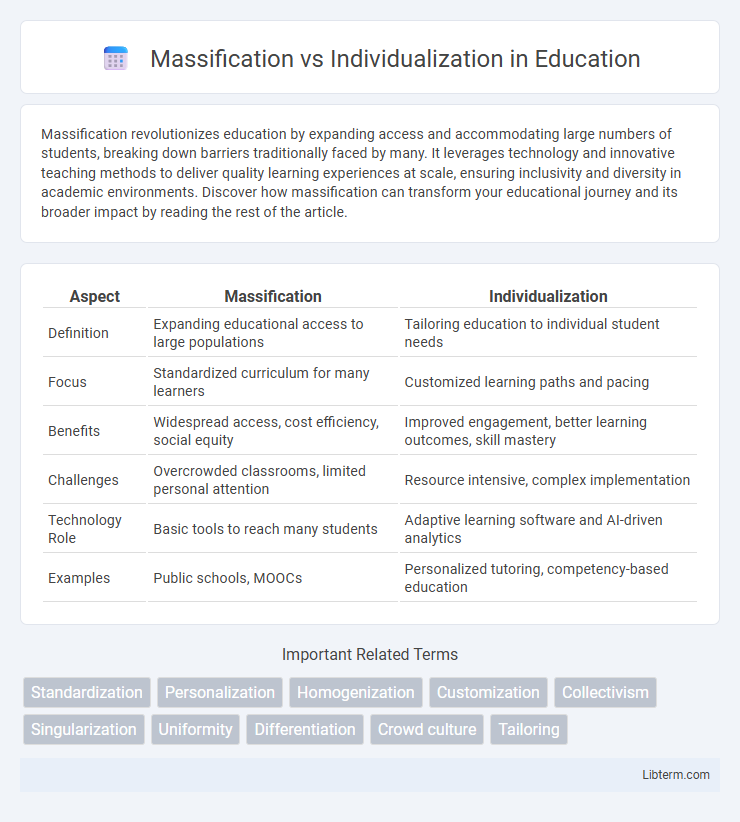Massification revolutionizes education by expanding access and accommodating large numbers of students, breaking down barriers traditionally faced by many. It leverages technology and innovative teaching methods to deliver quality learning experiences at scale, ensuring inclusivity and diversity in academic environments. Discover how massification can transform your educational journey and its broader impact by reading the rest of the article.
Table of Comparison
| Aspect | Massification | Individualization |
|---|---|---|
| Definition | Expanding educational access to large populations | Tailoring education to individual student needs |
| Focus | Standardized curriculum for many learners | Customized learning paths and pacing |
| Benefits | Widespread access, cost efficiency, social equity | Improved engagement, better learning outcomes, skill mastery |
| Challenges | Overcrowded classrooms, limited personal attention | Resource intensive, complex implementation |
| Technology Role | Basic tools to reach many students | Adaptive learning software and AI-driven analytics |
| Examples | Public schools, MOOCs | Personalized tutoring, competency-based education |
Introduction to Massification and Individualization
Massification refers to the process of making products, services, or experiences uniform and standardized for a large audience, emphasizing scale and broad accessibility. Individualization focuses on tailoring offerings to meet the unique preferences, needs, and behaviors of each person, often leveraging data and technology for customization. These two approaches represent contrasting strategies in industries such as education, marketing, and manufacturing, where the balance between efficiency and personalization drives decision-making.
Defining Massification: Key Concepts and Characteristics
Massification refers to the process by which educational opportunities, services, or products are expanded to encompass a large and diverse population, aiming for widespread access rather than exclusive or tailored experiences. Key characteristics include standardized curricula, centralized administration, uniform delivery methods, and economies of scale that prioritize quantity over customization. This approach often results in reduced individual attention but strives to democratize education by making it broadly accessible and affordable.
Understanding Individualization: Meaning and Importance
Individualization refers to tailoring experiences, products, or services to meet the unique needs and preferences of each person, enhancing relevance and engagement. This approach contrasts with massification, which targets broad audiences with uniform solutions, often overlooking individual differences. Understanding individualization is vital in fields like education, marketing, and healthcare, where personalized strategies improve outcomes and foster deeper connections.
Historical Evolution: From Massification to Individualization
The historical evolution from massification to individualization marks a shift from uniform, large-scale production and education systems designed to serve the majority to tailored approaches addressing individual needs and preferences. This transition reflects advancements in technology, data analytics, and social values emphasizing diversity and personal identity. As industries and institutions move from one-size-fits-all models, they increasingly adopt personalized strategies to enhance user experience and engagement.
Drivers Behind Massification in Modern Societies
Rapid urbanization and technological advancements drive massification by concentrating populations into dense metropolitan areas, facilitating standardized cultural and economic activities. Globalization intensifies massification through the widespread diffusion of media, consumer goods, and communication platforms, promoting homogenized lifestyles and social behaviors. Economic factors, including mass production and labor market demands, further reinforce massification by encouraging uniform consumption patterns and collective social identities.
The Rise of Individualization: Causes and Trends
The rise of individualization is driven by technological advancements, greater access to personalized data, and shifting consumer preferences toward customized experiences. Social media platforms and AI algorithms enable tailored content and products, reinforcing unique identity expression. This trend reflects broader socio-cultural movements emphasizing personal agency, diversity, and the rejection of one-size-fits-all solutions in education, marketing, and lifestyle choices.
Impact on Education: Mass Learning vs Personalized Approaches
Massification in education emphasizes standardized curricula and large-scale access, promoting widespread literacy and foundational skills across diverse populations. Individualization tailors learning experiences to student needs, leveraging adaptive technologies and differentiated instruction to enhance engagement and mastery. Personalized approaches improve retention and critical thinking by addressing unique cognitive styles, whereas mass learning prioritizes scalability and equity in resource-limited settings.
Economic Implications: Mass Production vs Customization
Mass production drives economic efficiency through economies of scale, lowering costs per unit and enabling affordable goods for a broad market. Customization, while increasing product differentiation and customer satisfaction, often raises production costs due to smaller batch sizes and more complex supply chains. Businesses must balance massification's cost advantages with individualization's potential for higher margins and consumer loyalty in competitive markets.
Social and Cultural Effects: Collective Identity vs Personal Expression
Massification drives the formation of collective identity by promoting shared values, norms, and cultural narratives within large social groups, leading to greater social cohesion and uniformity. Individualization emphasizes personal expression and unique identity construction, encouraging diversity and challenging traditional social roles and cultural expectations. Socially, massification can strengthen community bonds but risk cultural homogenization, while individualization fosters innovation and cultural pluralism but may contribute to social fragmentation.
Future Perspectives: Balancing Massification and Individualization
Future perspectives emphasize integrating advanced AI and big data analytics to balance massification and individualization in education, enabling scalable yet personalized learning experiences. Adaptive learning platforms leverage real-time data to customize content for diverse learner needs while maintaining standardized assessment benchmarks. This balance aims to enhance educational equity, efficiency, and learner engagement on a global scale.
Massification Infographic

 libterm.com
libterm.com